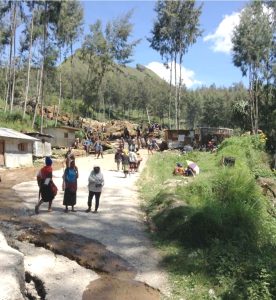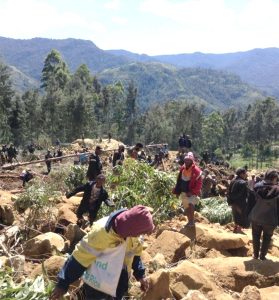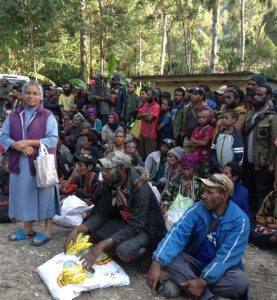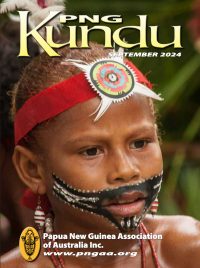Report on the May 2024 Landslide in Enga Province
CHRISTINE LEONARD
 This article is based on compiled reports prepared by Sr John Mary, secretary to Bishop Arnold Orowae, and Project Manageress of the Catholic Diocese Wabag, Enga Province. The situation is chaotic and, understandably, some are thought to be touting numbers to ensure the aid they need reaches them.
This article is based on compiled reports prepared by Sr John Mary, secretary to Bishop Arnold Orowae, and Project Manageress of the Catholic Diocese Wabag, Enga Province. The situation is chaotic and, understandably, some are thought to be touting numbers to ensure the aid they need reaches them.
Landslides and other natural disasters, such as frost, long dry seasons, heavy rains and earthquakes, are familiar to Engans, but the catastrophe that occurred on Friday, 24 May at 3 am local time was like nothing anyone had ever experienced before. Approximately 3,950 people resided in or near the mountain-based village of Kaokalam, in the ward of Yambali—Mulitaka, Porgera District, Enga Province. It is thought that not only did a massive landslide occur, but the accompanying earthquake caused big cracks throughout the rocky mountain from which fault lines run down to the nearby river.
Kaokalam was completely flattened, with everyone from one whole clan, Panges, of the Kipul tribe, directly affected. It was estimated that 1,500 people were impacted. According to survivors and community members at the time, 178 people were buried and more than 255 houses were sunk; five families were totally buried and, out of 250 families directly affected, some escaped and some died. The number of fatalities will increase as more bodies are exhumed or found.
Through the Catholic Diocese of Wabag, a team comprising diocese administration staff, nurses, health workers, volunteers and survivors was formed to address the basic needs of those most affected, especially survivors of Kaokalam village at Mulitaka. Immediately following the massive landslide, the team was dispatched to assess who was seriously injured, the number of deaths, other health issues and damage.
There was total confusion on the ground, partially due to the community having already formed a disaster committee that stated very high numbers of deaths and survivors. The numbers quoted were thought to be unrealistic but aimed at gaining as much support as possible from the various politicians, NGOs, government organisations and overseas funding agencies.
Landslides have left in their wake debris up to eight metres deep across 200 square km, cutting off road access, thereby making relief efforts difficult. People of goodwill, however, have helped the team reach the area with food and medicines. Immediately after the disaster, medical assistance was provided to 132 people with minor injuries. Those with major injuries were brought to Wabag Hospital and the Catholic health centres for further treatment, including trauma counselling. After medical attention was given, those who were able were returned to their community.
The diocese team found that 1,322 survivors from 250 affected households needed immediate basic needs and medical assistance. Provisions included food, clothing, medical assistance, temporary shelters, water, blankets, mats, dignity kits (sanitary items), other household items and cooking utensils. On 27 May, 10-kg bags of rice, tinned fish and noodles were distributed to 625 survivors across 125 directly affected households, along with medical assistance.
 The diocese committee negotiated with wholesalers in Wabag and Mt Hagen to purchase what was needed. Fortunately, these suppliers are passing on good discounts, knowing it is for the relief effort. Generous donations are coming in from Catholic agencies in Germany, MSC Mission Australia, Caritas PNG and the Catholic Diocese of PNG Kerema and Mendi. Items purchased included blankets, pillows, mats and plates, which were then transported to Wabag. Once goods arrive in Wabag, they are repacked for family units based on the number of households and moved to the Kasap Parish campus for distribution due to the huge number of people waiting in the disaster-affected area. A second distribution of relief materials took place on 20 June to 231 households and 1,107 survivors (283 males, 290 females, 280 male children and 254 female children). Medical assistance and trauma counselling are ongoing. Distribution of relief goods occurs amidst the backdrop of tribal fighting that is still occurring in some areas.
The diocese committee negotiated with wholesalers in Wabag and Mt Hagen to purchase what was needed. Fortunately, these suppliers are passing on good discounts, knowing it is for the relief effort. Generous donations are coming in from Catholic agencies in Germany, MSC Mission Australia, Caritas PNG and the Catholic Diocese of PNG Kerema and Mendi. Items purchased included blankets, pillows, mats and plates, which were then transported to Wabag. Once goods arrive in Wabag, they are repacked for family units based on the number of households and moved to the Kasap Parish campus for distribution due to the huge number of people waiting in the disaster-affected area. A second distribution of relief materials took place on 20 June to 231 households and 1,107 survivors (283 males, 290 females, 280 male children and 254 female children). Medical assistance and trauma counselling are ongoing. Distribution of relief goods occurs amidst the backdrop of tribal fighting that is still occurring in some areas.
Accurate data collection requires ongoing attention under very difficult circumstances. No one knows the exact figures for sure. After several attempts to verify data, the team believes that 55 people, including children and pregnant mothers, have died in the landslide disaster. In one family of nine, nobody survived. In other families, some died and some survived. Out of 55 deaths, 26 are refugees from surrounding districts, four from Daru-Kiunga. The term ‘refugees’ relates to people from nearby areas who have travelled to the area to escape tribal fights or visit from another province for various family reasons, as with the Daru-Kiunga people.
The term ‘household’ refers to immediate and extended family members sleeping in the same house. The number of households buried is estimated at 67, comprising 366 individuals, including refugees. One elementary school, three churches and a few stores were also buried. Twelve schoolchildren from elementary and primary schools have lost all their learning materials.
The next distribution phase the diocese team will focus on includes household items, clothes and water cans for 366 individuals, plus school materials for the children. The Government is developing a relocation program that will likely require building materials for the construction of houses and water tanks. For survivors to sustain themselves in the longer term, garden tools, seeds, seedlings, permanent and bush materials for houses, classrooms, health centres, water facilities and sanitation will be required.
 All the agencies involved in relief work rely on community support and international donors. Whilst not officially endorsed by PNGAA, if members want to contribute individually, they may do so through the MSC Mission Office donation system (click donate) on their website, as they are in direct contact with the Catholic Diocese of Wabag: https://www.mscmission.org.au/
All the agencies involved in relief work rely on community support and international donors. Whilst not officially endorsed by PNGAA, if members want to contribute individually, they may do so through the MSC Mission Office donation system (click donate) on their website, as they are in direct contact with the Catholic Diocese of Wabag: https://www.mscmission.org.au/
One hundred per cent of donations are sent to the project in Wabag.
Other funding agencies are also working in Enga. In direct response to the Government of Papua New Guinea’s request, Australia is providing technical experts in incident management assistance, geohazard assessments, as well as emergency relief.
This article was prepared with the co-operation of Fr Roger Purcell MSC, who has spent most of his life in PNG, and the images featured are from the MSC Mission Office website.


